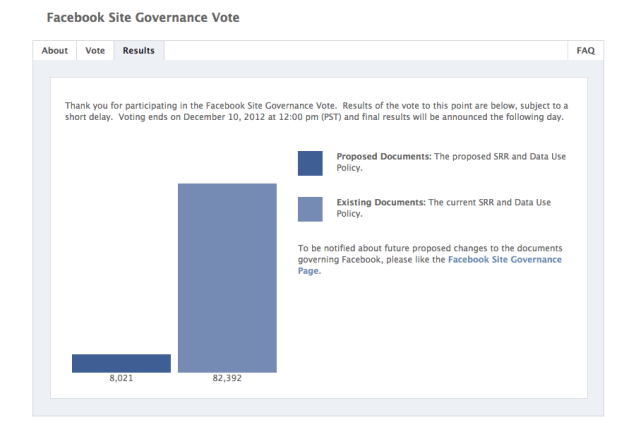
Facebook’s recently proposed changes to it its terms of service and privacy policy will pass, despite overwhelming opposition from users, if the rate of voting continues at its current pace.
Voting for the proposed changes to Facebook’s Data Use Policy (privacy policy) and Statement of Rights and Responsibilities (terms of service) began on Monday, December 3, at 12pm PT, and will close one week later, on December 10 at 12pm PT. At the time of this writing – approximately 24 hours after voting began – around 110,000 Facebook users have voted. Of those, less than 10,000 users, or about 9 percent, have voted in favor of the policy changes.
According to the voting rules set up by Facebook in 2009 following complaints from privacy advocates, a full 30 percent of Facebook users must vote against the changes to block the company from adopting them. At last count, Facebook now has 1 billion users, which means a full 300 million people must vote against the changes to block them.
Of course, this is almost certainly not going to happen. Currently, an average of about 4,400 Facebook users are voting each hour. If the rate of voting carries on at the same pace between now and December 10, less than a million Facebook users – around 750,000, by my calculations – will cast a ballot. And of those, 65,000 to 70,000 will be in favor of the changes, assuming the ratio holds up as well. That means the opposition against the policy changes will only reach about 0.23 percent of the total needed to block them from going into effect.
What’s at stake
Perhaps the most controversial change Facebook wants to make is to never hold a vote like this one ever again. Instead, the company wants “to end the voting component of the process in favor of a system that leads to more meaningful feedback and engagement.” What exactly that new system will look like remains a mystery.
While the “vote to give up your right to vote” change has made the most headlines, the other changes Facebook wants to make are equally controversial. They include giving Facebook greater ability to share your information with “affiliates” (i.e. Instagram), altering the controls that allow you to keep strangers from contacting you through Facebook Messages, and expansion of its advertising network. Facebook also wants to add additional notices in its Data Use Policy that explain to users that their privacy settings are limited; people can still see some of your information, even if you’ve enable the strictest privacy settings.
Last week, a pair of privacy advocacy groups, the Electronic Privacy Information Center (EPIC) and the Center for Digital Democracy (CDD), sent a letter (PDF) to Facebook’s Mark Zuckerberg, urging the CEO to drop the proposed changes entirely on the basis that they would put users at greater risk of identity fraud, malware, and spam. Facebook refused to comment on the letter.
Why the low turnout?
If these changes are so bad for users, as privacy advocates warn they are, then why the embarrassingly low turnout? Well, the first reason is because Facebook does little to promote the voting process, which was announced in a post on the Facebook Site Governance page. Only 2.6 million people subscribe to this page, which means only a few would see the initial post about the vote.
The second reason is that, historically, most Facebook users seem not to care very much about how the social network changes its policies – the legal contracts we all sign in order to use the service. In fact, the last time Facebook held a vote on policy changes, in June of 2011, a mere 342,632 people cast their vote.
To get involved in Facebook’s faux-democracy, access the voting app here, and cast your vote. Will it matter? Not likely. But it certainly won’t hurt.
